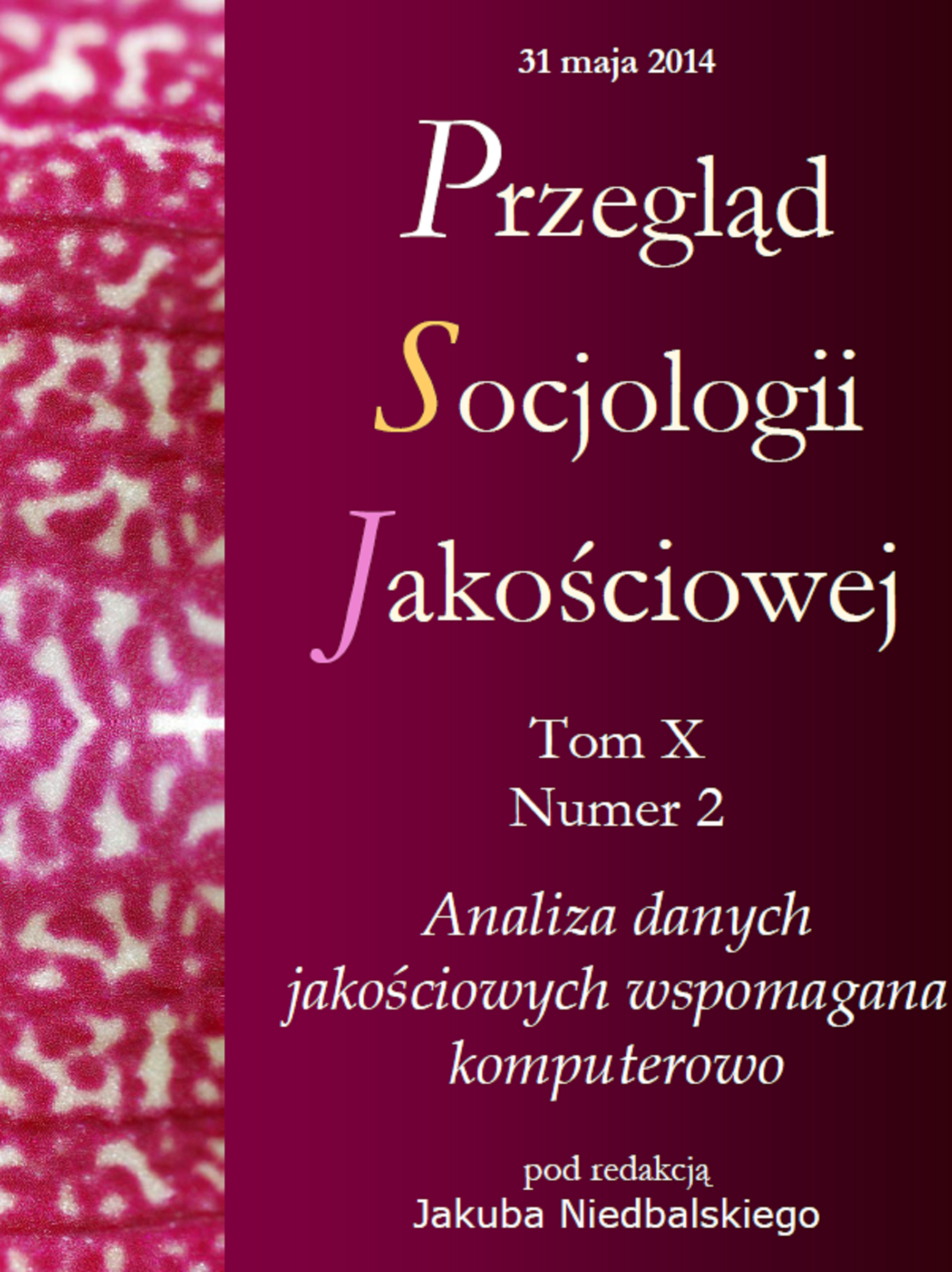The Application of Atlas.ti and NVivo Software in Conducting Researches Based on Grounded Theory Methodology
DOI:
https://doi.org/10.18778/1733-8069.10.2.04Keywords:
Computer Assisted Qualitative Data Analysis Software, New Technologies, Social Research Methods, Methodology of Grounded Theory, NVivo, Atlas.tiAbstract
This article raises a topic of special software applied to support the analysis of qualitative data in research which is based on the procedures of grounded theory methodology (GTM). The purpose of this article is to demonstrate what kind of relations occur between the methodology procedures of grounded theory and two popular programs of CAQDA group: NVivo and Atlas.ti. This article is intended to show in what ways these two programs can be used to provide a GT-based analysis. In the article, there is a demonstration of both technical and applicable possibilities of NVivo and Atlas.ti software. Moreover, this article points out a degree of adequacy of technical solutions applied in both programs in order to meet the requirements of grounded theory methodology, as well as some restrictions and barriers which can be encountered by a researcher who uses a particular computer program in GT-based research.
Downloads
References
Bringer Joy D., Johnston Lynne H., Brackenridge Celia H. (2004) Maximizing Transparency in a Doctoral Thesis1: The Complexities of Writing About the Use of QSR*NVIVO Within a Grounded Theory Study. „Qualitative Research”, vol. 4, no. 2 s. 247–265 [dostęp 10 października 2012 r.]. Dostępny w Internecie http://qrj.sagepub.com/content/4/2/247
Google Scholar
DOI: https://doi.org/10.1177/1468794104044434
Bringer Joy D., Johnston Lynne H., Brackenridge Celia H. (2006) Using Computer-Assisted Qualitative Data Analysis Software to Develop a Grounded Theory Project. „Field Methods”, vol. 18, no. 3 s. 245–266 [dostęp 10 października 2012 r.]. Dostępny w Internecie http://fmx.sagepub.com/content/18/3/245
Google Scholar
DOI: https://doi.org/10.1177/1525822X06287602
Brosz Maciej (2012) Komputerowe wspomaganie badań jakościowych. Zastosowanie pakietu NVivo w analizie materiałów nieustrukturyzowanych. „Przegląd Socjologii Jakościowej”, t. 8, nr 1 s. 98–125 [dostęp 20 listopada 2012 r.]. Dostępny w Internecie http://www.przegladsocjologiijakosciowej.org
Google Scholar
DOI: https://doi.org/10.18778/1733-8069.8.1.06
Budziszewska Magdalena (2010) Możliwości i wykorzystanie programu Atlas.ti w psychologicznych badaniach narracyjnych [w:] Maria Straś-Romanowska, Bogna Bartosz, Magdalena Żurko, red., Badania narracyjne w psychologii. Warszawa: Wydawnictwo Psychologii i Kultury, s. 83–100.
Google Scholar
Fielding Nigel (2007) Computer Applications in Qualitative Research [w:] Paul Atkinson et al., eds., Handbook of Ethnography. Los Angeles, London, New Delhi, Singapore: Sage, s. 453–467.
Google Scholar
DOI: https://doi.org/10.4135/9781848608337.n31
Gibbs Graham (2011) Analizowanie danych jakościowych. Przełożyła Maja Brzozowska-Brywczyńska. Warszawa: Wydawnictwo Naukowe PWN.Glaser Barney G. (1978) Theoretical Sensitivity. San Francisco: The Sociology Press.
Google Scholar
Glaser Barney G., Holton Judith (2004) Remodeling Grounded Theory. „Forum Qualitative Sozialforschung/Forum: Qualitative Social Research”, vol. 5, no. 2, Art. 4 [dostęp 20 listopada 2012 r.]. Dostępny w Internecie http://www.qualitative-research.net/index.php/fqs/article/view/607/1315
Google Scholar
Glaser Barney G., Holton Judith (2010) Przemodelowywanie teorii ugruntowanej. Przełożyli Marek Gorzko i Łukasz Pyfel. „Przegląd Socjologii Jakościowej”, t. 6, nr 2, s. 81–102 [dostęp 15 września 2013 r.]. Dostępny w Internecie http://www.qualitativesociologyreview.org/PL/Volume13/PSJ_6_2_Glaser_Holton.pdf
Google Scholar
DOI: https://doi.org/10.18778/1733-8069.6.2.04
Glaser Barney G., Strauss Anselm L. (1967) The discovery of grounded theory. Strategies for qualitative research. Chicago: Aldine Publishing Company.
Google Scholar
Gorzko Marek (2008) Procedury i emergencja. O metodologii klasycznych odmian teorii ugruntowanej. Szczecin: Wydawnictwo Naukowe Uniwersytetu Szczecińskiego.
Google Scholar
Jones Michael, Diment Kieren (2010) The CAQDA Paradox: A divergence between research method and analytical tool. „The International workshop on Computer-Aided Qualitative Research Asia: (CAQRA2010)”. The Netherlands: Merlien Institute.
Google Scholar
Kelle Udo (2005) Komputer-Assisted Qualitative Data Analysis [w:] Clive Seale i in.., eds., Qualitative Research Practise. London, Thousand Oaks, New Delhi: Sage, s. 473–489.
Google Scholar
Konecki Krzysztof (2000) Studia z metodologii badań jakościowych. Teoria ugruntowana. Warszawa: Wydawnictwo Naukowe PWN.
Google Scholar
Lewins Ann, Christian Silver (2004) Choosing CAQDAS software. CAQDAS Networking Project. Guildford: University of Surrey.
Google Scholar
Lonkila Markku (1995) Grounded theory as an emerging paradigm for computer-assisted qualitative data analysis [w:] Udo Kelle, ed., Computer-Aided Qualitative Data Analysis. London: Sage, s. 41–51.
Google Scholar
Miles Matthew B., Huberman Michael A. (2000) Analiza danych jakościowych. Przełożył Stanisław Zabielski. Białystok: Transhumana.
Google Scholar
Niedbalski Jakub (2013) Odkrywanie CAQDAS. Wybrane bezpłatne programy komputerowe wspomagające analizę danych jakościowych. Łódź: Wydawnictwo Uniwersytetu Łódzkiego.
Google Scholar
DOI: https://doi.org/10.18778/7525-881-3
Niedbalski Jakub (2014) Komputerowe wspomaganie analizy danych jakościowych. Zastosowanie oprogramowania NVivo i Atlas. ti w projektach badawczych opartych na metodologii teorii ugruntowanej. Łódź: Wydawnictwo Uniwersytetu Łódzkiego.
Google Scholar
DOI: https://doi.org/10.18778/7969-060-2
Niedbalski Jakub, Ślęzak Izabela (2012) Analiza danych jakościowych przy użyciu programu NVivo a zastosowanie procedur metodologii teorii ugruntowanej. „Przegląd Socjologii Jakościowej”, t. 8, nr 1 s. 126–165 [dostęp 20 listopada 2012 r.[. Dostępny w Internecie http://www.przegladsocjologiijakosciowej.org
Google Scholar
DOI: https://doi.org/10.18778/1733-8069.8.1.07
Saillard Elif K. (2011) Systematic Versus Interpretive Analysis with Two CAQDAS Packages: NVivo and MAXQDA. „Forum: Qualitative Social Research”, vol. 12, no. 1 [dostęp 30 września 2012 r.]. Dostępny w Internecie http://www.qualitative-research.net/index.php/fqs/article/view/1518
Google Scholar
Salinger Stephan, Plonka Laura, Prechelt Lutz (2007) A Coding Scheme Development Methodology Using Grounded Theory for Qualitative Analysis of Pair Programming, „Human Technology”, vol. 4, no. 1, s. 9–25.
Google Scholar
DOI: https://doi.org/10.17011/ht/urn.200804151350
Schönfelder Walter (2011) CAQDAS and Qualitative Syllogism Logic—NVivo 8 and MAXQDA 10 Compare. „Forum: Qualitative Social Research”, vol. 12, no. 1 [dostęp 30 września 2011 r.]. Dostępny w Internecie http://www.qualitative-research.net/index.php/fqs/article/view/1514
Google Scholar
Seale Clive (2008) Wykorzystanie komputera w analizie danych jakościowych [w:] David Silverman, red., Prowadzenie badań jakościowych. Warszawa: Wydawnictwo Naukowe PWN, s. 233–256.
Google Scholar
Silverman David (2008) Interpretacja danych jakościowych. Przełożyła Joanna Ostrowska. Warszawa: Wydawnictwo Naukowe PWN.Strauss Anselm L. (1987), Qualitative Analysis for Social Scientists. Cambridge: University Press Cambridge.
Google Scholar
Strauss Anselm. L., Corbin Juliet (1990) Basics of Qualitative Research. London–New Delhi: Sage.
Google Scholar
Wiltshier Fiona (2011) Researching With NVivo. „Forum: Qualitative Social Research”, vol. 12, no. 1 [dostęp 30 września 2012 r.]. Dostępny w Internecie http://www.qualitative-research.net/index.php/fqs/ issue/view/36
Google Scholar
Downloads
Published
How to Cite
Issue
Section
License

This work is licensed under a Creative Commons Attribution-NonCommercial-NoDerivatives 4.0 International License.














